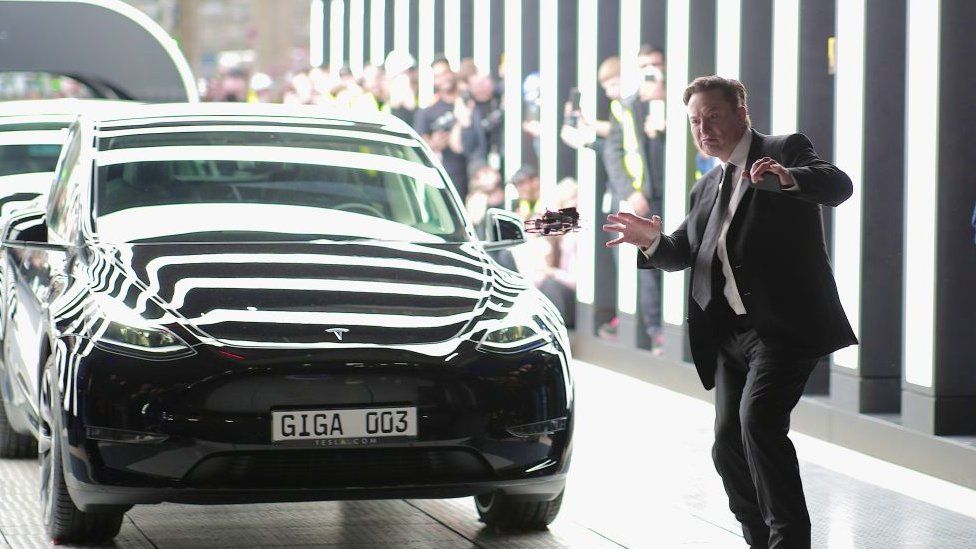Elon Musk in China to discuss enabling Full Self Driving
- Published

Elon Musk is visiting Beijing with media reports saying he aims to discuss enabling autonomous driving mode on Tesla cars in China.
Mr Musk wants to enable Full Self Driving (FSD) in China and transfer data collected in the country abroad to train its algorithms.
FSD is available in countries including the US but not in China.
The news came after a US report tied Tesla's autonomous driving modes to at least 13 crashes, involving one death.
During a meeting with Chinese Premier Li Qiang, Mr Musk was quoted by state media as saying Tesla was willing deep cooperation with China to "achieve more win-win results".
In response, Mr Li told Mr Musk the Chinese market would "always be open to foreign-funded firms," according to the reports.
China is Tesla's second-biggest market. Other carmakers such as Xpeng - headquartered in Guangzhou - have been attempting to compete with Tesla by rolling out similar self-driving functions in their cars.
On Sunday, Mr Musk described Chinese car manufacturers as "the most competitive car companies in the world".
Tesla has previously taken steps to reassure Chinese authorities about the rollout of FSD in the country, including establishing a data centre in Shanghai to process data about Chinese consumers in accordance with local laws.
The trip comes days after the US's National Highway Traffic Safety Administration (NHTSA) said it was investigating whether a recall successfully addressed safety concerns relating to Tesla's driver assistance system.
The NHTSA said that despite requirements that drivers maintain focus on the road and be prepared to take control at a moment's notice when autonomous driving was enabled, drivers involved in the crashes "were not sufficiently engaged". The regulator's analysis was conducted before a recall Tesla said would fix the issue.
Tesla's software is supposed to make sure that drivers are paying attention and that the feature is only in use in appropriate conditions, such as driving on highways.
Mr Musk has promised that Teslas will be able to act as autonomous "robotaxis" for years. In 2015, he said Teslas would achieve "full autonomy" by 2018. And in 2019, he said the company would have robotaxis operating by the following year.
This month, the Tesla chief executive said he would reveal the company's robotaxi in August.
Critics accuse Mr Musk of consistently hyping up the prospects of full autonomous driving to prop up the company's share price, which has fallen on the back of challenges including falling demand for electric vehicles worldwide and competition from cheaper Chinese manufacturers. Mr Musk denies the accusations.
Tesla has been cutting the prices of its cars in China and other markets to drum up demand.
"Tesla prices must change frequently in order to match production with demand," Mr Musk recently said on X, the microblogging platform previously known as Twitter which the billionaire owns.
Tesla recently reported a 13% fall in automotive sales to $17.3bn (£13.7bn) for the first three months of this year.
Overall sales across Tesla dropped by 9% while its profits fell sharply to $1.13bn compared to $2.51bn for the same period last year.
So far in 2024, its share price has collapsed by 32%.
- Published2 January
- Published12 March